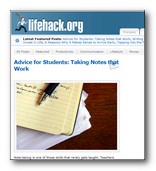 I threw this link into an aside, and then thought better of it. It might get lost there, and this latest post from the consistently pragmatic Dustin Wax on Taking Better Notes has a plethora of great tips. He also introduces the Cornell System for notetaking which I find quite intriguing and well worth a look.
I threw this link into an aside, and then thought better of it. It might get lost there, and this latest post from the consistently pragmatic Dustin Wax on Taking Better Notes has a plethora of great tips. He also introduces the Cornell System for notetaking which I find quite intriguing and well worth a look.
As I mentioned in comment to this post, these hints and tips should remind the lecturer to also consider this process from the lecturees’ side and imagine how media such as Powerpoint or overheads can tie into the most effective delivery and retention of materials. My humble contribution to this was ensure that when using technology try to ensure that the link is made between where the lecture is and how this ties into the bigger picture. I have seen many different examples of this ranging from the simplest of periodically referring to the lecture outline and reminding where the material is at, to keeping a rolling outline always visible in the top corner of a presentation.
My contribution here is rather weak, but the article by Dustin is quite strong and I recommend it for consideration.

Thanks as always. This is the other side of professor’s complaints about student note-taking, I think: the unwillingness to imagine ourselves in their shoes. We remember when we were students and how nobody needed to hold our hands — but professors are, by definition, academically talented (or desperately misguided in their career choices!). We are usually the top few percent of our academic cohorts, people who are innately drawn to academic pursuits and comfortable in that milieu. Most of our students are like most of the people we went to school with (but paid little attention to): much less interested and much less innately skilled/talented at the “stuff” of academic life. Unless we resign ourselves to teaching the few percent of our students who are basically like us, we have to think about how these skills and talents can be developed in people to whom they don’t come naturally — as well as figuring out what might work better for those students.
[…] week I pointed readers to the excellent article by Dustin Wax comparing note-taking methodologies and weighing the pros and cons of a couple techniques. I was not personally aware of the Cornell […]